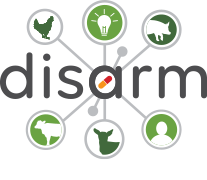DISARM participated in EU-Canadian workshop exploring joint research priorities on AMR

On the 4th and 5th of February, DISARM was represented at a workshop to explore joint research priorities between Canada and the EU on the topic of antimicrobial resistance. The workshop was organized by the Canada-EU PLC Task Force which has the objective to foster coordination between the EU and Canada regarding research on technology, science and innovation.
In the first part of the workshop, researchers from Canada and the EU presented an overview of the state of the art research being executed on the topic of Antimicrobial Resistance (AMR). The Canadian researchers presented their research agenda on monogastric and ruminant animals and on the environmental aspect of AMR. In monogastrics a lot of research is going into alternative feeding strategies as alternatives to antibiotics, immune modulation, microbiome manipulation and vaccination. In ruminants the focus lies on the mechanisms of transferring antimicrobial resistance, alternatives to antimicrobial use and specifically on genetic technologies.
The European research projects presented and discussed were the One Health European Joint Programme, Healthy Livestock, DISARM, ROADMAP, and AVANT. The Healthy Livestock project focuses on intensive production in pigs and poultry, concentrating on reducing the risk for exposure to pathogens, improving the resilience of pigs and poultry, early warning systems for better animal health management, precision medication technologies and potential alternatives for antibiotics. Similarly, AVANT is a research project which just started to investigate and test potential promising alternatives to prevent and treat post-weaning diarrhoea in pig production. ROADMAP is a research project focusing on socio-economic and institutional innovations that can stimulate or foster the transition to a more prudent use of antimicrobials in the livestock industry.

In the second part of the workshop, the participants also collaborated on identifying common research priorities. To name a few important ones from the long list of identified priorities:
- More fundamental research to understand the host and (pathogenic) bacterial interactions to see what healthy microbiomes are and how they evolve through the animals’ lifespan and under changing diets and environments
- Rethinking of current risky animal husbandry practices that can lead to AMR and focus on optimal housing conditions, feed and feeding strategies that promote animal health and making us of state-of-the art technologies to support modern stockmanship.
- Socio-economic and institutional incentives to promote and foster prudent antimicrobial usage in the livestock industry.
- Alternatives to antimicrobials to be used in the livestock industry to be able to safeguard and maintain animal health and welfare with lesser need for antibiotics.
- Innovative veterinary diagnostics that can assist animal health professionals in rationalizing the use of antimicrobials in practice.
We were happy and privileged as DISARM to be able to contribute to this future outlook on necessary internationalresearch on AMR for the benefit of the livestock industry and the global society as a whole.

